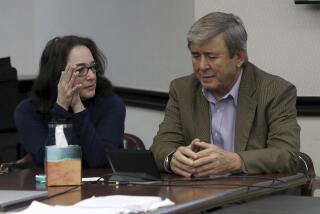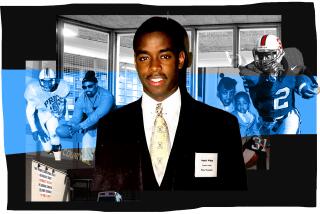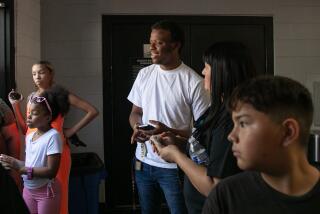Families of Harris’ Victims Can’t Hold Back the Tears
SACRAMENTO — Seated around an oblong table in the quiet hush of a plush office, Sharron Mankins cried and cried Wednesday as she told Gov. Pete Wilson about her son, Michael Baker.
He loved to fish and ride a skateboard, she said. He was bashful and considerate, she said. “And a part of me died when I lost Michael,” when he was killed nearly 14 years ago by Robert Alton Harris, she said as the tears spilled forth.
Mankins was not the only one overcome with emotion Tuesday in the private meeting Wilson held with relatives of the two boys killed by Harris: Baker and his best friend, John Mayeski.
Michael Baker’s sister cried. John Mayeski’s sister wept. Even Steve Baker, Michael Baker’s father and a hardened San Diego police officer, said his voice cracked while he spoke to Wilson.
All those feelings were slightly embarrassing, the family members said in interviews Tuesday night with The Times aboard the plane that took them back to San Diego from Sacramento.
But, on a day otherwise jammed with legal arguments and scientific theories, they said it stamped a human touch on the proceedings, reminding Wilson of their pain and grief.
“We’re living, breathing persons,” Sharron Mankins said on the plane. “We’re hurt. And we have been for so many years.”
“In his mind, he now knows for real, in person, in color, how we feel,” said Linda Herring, Mankins’ daughter and Michael Baker’s sister. Herring said she felt “very good about our meeting. I felt it went extremely well. He took us extremely seriously.”
Wilson remained composed through the hourlong meeting, the relatives said. But he and aides passed out tissues and water and “seemed compassionate and concerned,” Mankins said.
The governor seemed so warm, said Marilyn Clark, John Mayeski’s sister, that, at the end of the hour, she was tempted to give him a hug. “I reached up twice to hug him,” she said. “I had to restrain myself.”
Brian Michaels, the chief deputy San Diego district attorney, said he, too, was touched. Michaels presented the families’ case after Wilson heard a plea for leniency from Harris’ lawyers. The two separate sessions were part of the first clemency hearing in California since the 1960s.
“Their pain is so deep, and it’s been held in for so many years, that, when they let it out in the room, it affected everybody,” Michaels said on the plane.
That emotion, Michaels said, “was part of what I wanted to show the governor. It’s why I took five family members rather than take medical experts” who would have disputed the defense claim that Harris suffers from brain damage leaving him unable to control his impulses.
There was not, however, a crying strategy, Michaels said. “It was not rehearsed,” said Mankins, who also wiped away tears when Michaels recounted the killings for reporters at a press conference after the meeting.
Michaels had opened the session with Wilson by telling him the story of the killings, stressing that Harris carefully planned and executed the slayings and a bank robbery on July 5, 1978.
Then it was Mankins’ turn. She stood up, to formally address Wilson, who sat at the head of the table.
“He said, ‘Mrs. Mankins, sit down. I want you to be comfortable,’ ” said Linda Herring, Michael Baker’s sister. “It wasn’t a formal thing. It was comfortable. Just like a normal conversation.”
Steve Baker followed Sharron Mankins, his ex-wife. Referring to defense efforts to sway Wilson with a recently made videotape plea for mercy that included actor Mike Farrell, Baker said he told the governor, “I can’t afford to make a video or hire a Hollywood star to make my case. The people here today are speaking from the heart.”
Herring was next. She cried while she described the suffering she imagines her brother, shot four times, endured before he died. Then she said she had a question for Wilson.
“My mom has written to you three or four times,” Herring said she told Wilson. “You have never responded. Yet celebrities, Mother Teresa, that guy from MASH (actor Farrell, an anti-death penalty advocate), they talk to you, and it seems like you automatically respond. We’re not movie stars or saints. Why haven’t you responded?”
After conferring with aides, Wilson apologized, Herring said. “He totally apologized,” she said. “That was nice.”
Clark followed Herring. She went through several tissues and two glasses of water during her five-minute plea, she said.
“I asked him if he had any children, and he said he had stepsons,” she said on the plane. “I said, ‘Imagine those being brutally murdered. Then you’d have to take this ordeal on yourself like we have.’
“I said to him, ‘I don’t want to see any more mothers, any more families go through what we’ve gone through. You can make sure that justice goes through and no other families will have to suffer.’ ”
Her speech, Clark said, was completely off the cuff. “I wanted to put it so that he could put on our shoes and see how we felt,” she said. “That’s why I asked whether he had children.”
The final speaker was Ed Mayeski, brother of John Mayeski.
“I told him about the agony, the nightmares we have, the trauma,” Mayeski said on the plane. “I also told him I thought this whole process was going to take four or five years. Now it’s 14. And we’re still fighting the same fight. I told him the system is taking way too long.”
Wilson had no questions, the relatives said. When the meeting wrapped up, Herring said, Wilson thanked them for coming and saw them to the door.
“Now the question is, when’s the governor going to come out with a decision?” Baker said. “I wouldn’t think it will be very long.”
More to Read
Get the L.A. Times Politics newsletter
Deeply reported insights into legislation, politics and policy from Sacramento, Washington and beyond. In your inbox three times per week.
You may occasionally receive promotional content from the Los Angeles Times.










